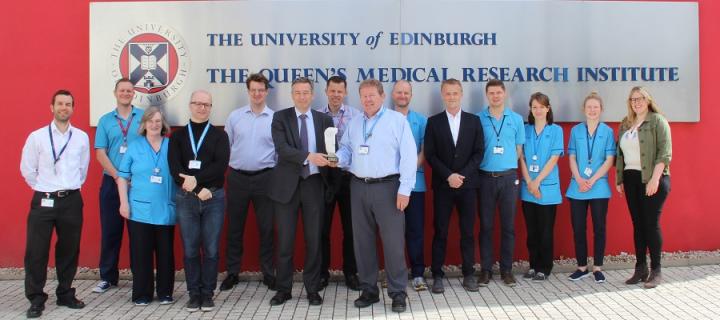Scanner scheme that halves heart disease death rates wins award
Medical imaging experts whose work has improved diagnosis of heart disease have received a prestigious national award.

The team has developed a method of spotting signs of heart disease using CT scans. Their research has helped to target preventive therapy to those in danger of suffering a heart attack.
It has also helped to reduce the need for unnecessary invasive diagnostic tests to identify those at most risk and used vital healthcare resources more appropriately.
Prompting new treatments
Clinical trials of the technique found that around a quarter of patients had their diagnoses reclassified after receiving the scan, prompting new treatments in many cases.
Reducing deaths
The approach has cut the number of deaths from heart disease by half compared with people who underwent standard diagnostic tests. It has also helped to reduce the number of people experiencing a subsequent heart attack.
Award winners
The team from the University of Edinburgh and NHS Lothian have received the Imaging Team of the Year Award from the British Medical Journal in recognition of their success.
Their technique – called computed tomography coronary angiography (CTCA) – is now the preferred method of carrying out initial checks on patients arriving at hospital with chest pains according to the National Institute for Healthcare Excellence.
We were immensely proud to receive the BMJ Awards for Imaging Team of 2017 for “CRIC and SCOTHEART”, which demonstrated our highly regarded cardiac imaging programme is top notch. This team is multidisciplinary and multimodality, with radiologists, cardiologists, physicists, clinics staff and radiographers working together to deliver best clinical and research management of patients with a wide range of cardiovascular diseases. The SCOTHEART study was at the heart of changing practice for patients with chest pain, and led to the recently revised NICE guidelines. This will lead to greater diagnostic accuracy, while avoiding unnecessary interventional procedures.
Cohesive team work
Judges of the award said this truly represented cohesive team working. “A Patient centred approach, focused on improving patient care and patient pathway. A reproducible game-changer, with good and long term outcome data,” they said.
CTCA has transformed how we manage patients who arrive at hospital with chest pains due to suspected coronary heart disease. This approach is now the first line investigation of choice for the NHS.
Tracey Gillies, Medical Director of NHS Lothian, said: “We helped to fund this research because we felt it had the potential to improve significantly the quality of care heart patients receive. We are very proud of the two teams involved; their work is truly pioneering and the techniques.

